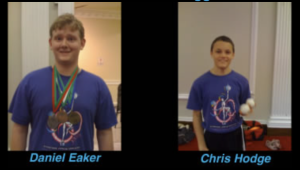By David Maurer
Like cheap boomerangs that never return, juggling balls often get abandoned in frustration.
Mastering the basic three-ball cascade pattern is the key to unlocking the door to the world of juggling. Getting a grip on this essential skill is so vital that most jugglers remember the time, date and location when they first achieved it.
Some people can learn to do the three-ball aerial rotation in a matter of minutes, while others can take a week or longer. A little advice and guidance from a teacher during the initial learning phrase can help a great deal.
Charlottesville is blessed with one of the best, and perhaps most kicked-back, juggling clubs in the nation. One of the most accomplished members of the Air Raid Juggling Club is professional juggler and internationally renowned showman Mark Nizer.
“I am so proud of the Charlottesville club, and I have been a member of some of the biggest and most active [juggling] clubs in the world, including the ones in New York City and Los Angeles,” said Nizer, who lives with his family in Albemarle County. “I am constantly inspired by the kids and adults in our club, and it really shows the great thing about juggling — that no matter how much you know, there is always more to learn and experience.
“I am passionate about giving back to the community through free juggling. It has been a formative part of my life and can give so much to so many.”
The local club basically asks only two thing from its members — have fun, and teach others what you can. Its official mission is to spread the art of juggling throughout the area — but according to Philip Lewis, one of the club’s founding members, it’s even simpler than that.
“Our mission is to help everyone who wants to learn how to juggle,” said Lewis, who has been juggling everything from balls to bowling pins for a quarter-century. “There’s no behind-the-curtain juggling secrets we keep to ourselves here.
“If you want to learn how to juggle, we’ll help you, it’s as simple as that. Nobody should believe they can’t juggle, because we’ll take the time to teach you.
“If you want to put the time and effort into it you can become a wonderful juggler. But you don’t have to reach for the sky. You can be a recreational juggler like myself who just has fun doing it.”
The club has no entrance fee, dues or age limit. Some of its most accomplished members are teenagers. In head-to-head competition at the 2008 International Jugglers’ Association Festival and Championships held in July in Lexington, Ky., four of the club’s youngest members did remarkably well.
Chris Hodge, 15, won both the four- and five-ball extreme juggling championships at the competition. This category requires contestants to perform the most difficult juggling trick they can manage within a minute.
Chris also won the four-ball penguin contest. This trick requires him to juggle with his hands pointed outward as if they were flippers. He and his 13-year-old brother, Andrew, teamed up to take second place in the number ball passing championships by passing 12 balls between them for 93 catches.
Not to be left out, their 8-year-old brother, Danny, won the five-ring juggling contest for participants younger than 15. What makes the accomplishments of the Nelson County brothers all the more remarkable is that they have been juggling for less than three years.
“About two and a half years ago my dad gave Andrew a video of the International Jugglers’ Association Festival in 2005,” said Chris, who practices juggling three to four hours a day. “Watching the video we saw all the things we could do with juggling and that’s what got us interested.
“It took me two full days of practicing before I did a three-ball cascade for the first time. It felt hard at first, but then I got the hang of it and it wasn’t hard anymore.
“It’s a lot of fun, and because I can constantly see improvement it doesn’t seem like a waste of time. My next goal is to get 40 catches with six balls.”
The boys’ father, Alan Hodge, has been juggling since he was 16. Until he gave the video to Andrew as a birthday present, none of his sons had shown an interest in juggling.
“Chris and Andrew got into juggling first, and then about six months later Danny picked it up,” Hodge said. “Our oldest son, Tim, also juggles, but Chris is the one who is most passionate about it.
“I’m very surprised at how good they have gotten. Even Danny has surpassed me for the most part. I can do more things than he can, but his most difficult things are harder than my most difficult things.
“I think Andrew and Danny are doing it just for fun, but Chris talks about making a career of it. I don’t know how much demand there is out there for jugglers, but he recently started a business where he sells juggling props on his Web site, http://www.penguin juggling.com.”
Daniel Eaker, 17, also toys with the idea of becoming a professional juggler one day.
At the recent juggling festival he tied for first place in the numbers juggling competition by juggling nine balls for 25 catches. He also earned a silver medal for juggling eight rings for 16 catches, and a bronze medal for juggling six clubs for 12 catches.
Every Wednesday, Daniel drives from Richmond to participate in the club’s weekly get-together in Venable Elementary School’s gym in Charlottesville.
He got interested in juggling a few years ago after watching the wildly popular video on the Internet that shows comedian and juggler Chris Bliss juggling to the music of the Beatles’ song “Golden Slumbers.”
“That video made juggling look really cool,” Daniel said after working up a sweat juggling rings. “His routine was so well put together that it made me want to do it.
“I found a bunch of different juggling stuff on the Internet. I think the reason why I love juggling so much is that there is so much to it.
“From an outsider’s perspective it might look very repetitive, but there’s more to it than that. There’s so many different ways to throw things up and down. It has gotten to the point where people are now bounce-juggling things off the floor.”
Daniel said he has learned a lot from other members of the club. One of his mentors is Nizer, who teaches that juggling alone isn’t enough. He believes in order to have a viable professional act, one must mix comedy with juggling and also interact with the audience.
“Mark is a great juggler and performer who is a real inspiration to me,” Daniel said. “He is a great guy to be around, and he has given me a lot of performance tips.
“Sometimes when people see juggling they don’t take it seriously. They think it’s a party trick or something that clowns do.
“What I would like people to understand is that it really is an art and a sport. When you’re first learning, it definitely takes a lot of concentration. After you’ve been juggling for a while, it becomes a rhythm and a feel.
“When you first start to juggle you don’t realize how much of it is the feel of the pattern, as opposed to actually seeing it. I’ve been doing it for so long now that I can actually feel a mistake in the pattern before I can see it.”
Pat Hunter, who now lives in Atlanta, is credited for founding the local juggling club in the late 1980s.
One of the first members he recruited was Aer Stephen, who is still active in the club.
“Pat got a bunch of us math geeks from the University of Virginia together to form the club,” Stephen said. “Math people tend to have brains that like juggling.
“The club waned a little in the late 1990s, but then Mark Nizer moved to the area. He got together with Pat, who was living in Lexington at the time, and they reformed the club and it has been going strong ever since.”
Tom Hamill, an aerospace engineer with Northrop Grumman, drives down from his home in Bealeton every week to attend meetings. He said the three-hour roundtrip drive is well worth it because of the high-quality jugglers in the club.
“Juggling is an activity that endlessly challenges you without putting pressure on you,” said Hamill, who conquered the three-ball cascade in September 1983 when he was a freshman at Syracuse University.
“There’s always new tricks to learn. A lot of times you may think you have reached the end as far as what you can do.
“Then you go to the Internet to see what other people are doing, and it opens this whole new vista for you. There doesn’t seem to be a far end to juggling.”
People have been known to juggle everything from running chainsaws to bowling balls. Hamill started with softballs, but suggests a cheap alternative for beginners.
“Get three tennis balls and cut a small slit in each of them,” Hamill said. “Then put a dozen or so pennies in each one, and that will give you a decent weight.
“The main key is to start out slowly. Most people, even experienced jugglers trying to learn a new trick, tend to try to go too fast.
“It just takes persistence to get over that first hurdle, which is learning the three-ball cascade. The tendency is to get frustrated, throw the balls on the ground and walk away.
“That’s OK, but come back to it in 20 or 30 minutes and I bet you’ll make progress. It’s a great feeling to conquer this thing that had once seemed so insurmountable.”
The Air Raid Juggling Club meets from 6 to 8:00 p.m. Wednesdays at ACAC Adventure Central in Charlottesville, VA.
Visit the Daily Progress




